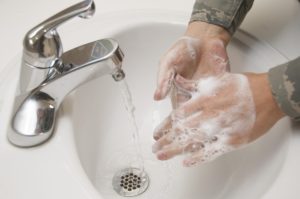Prevention is better than cure, this is a widely used statement to get people to be mindful of their health. But how do we really do it? How can we be effective at it? Can we be cost-effective at the same time?
With the growing number of healthcare facilities and different pharmacological options for treatment, a lot folks are happy about the advancements and they tend the fact that they just can avoid getting sick.
Most communicable diseases are gotten from the most common places we interact with.
- Homes
- Offices
- Malls
- Hospitals
Here are some helpful tips that can reduce your risk of catching a sickness:
1. Handwashing
 Washing your hands is the single most effective way of preventing illnesses. It prevents a lot devastating deadly diseases like diarrhea, respiratory infections, hand-feet-disease etc. According to Centers for Disease Control and Prevention, hand washing reduces the number of people who get sick with diarrhea by 23-40%.
Washing your hands is the single most effective way of preventing illnesses. It prevents a lot devastating deadly diseases like diarrhea, respiratory infections, hand-feet-disease etc. According to Centers for Disease Control and Prevention, hand washing reduces the number of people who get sick with diarrhea by 23-40%.
By washing hands after going to restroom, or shaking hands with a stranger, or paying in a coffee shop, we are killing a lot of bacterias and germs. By stopping those harmful germs to get into our body we are reducing our risk to get sick by more than 70%.
You should wash your hands:
- Before eating
- Before and after attending to a sick individual
- Before and after nursing an open wound
- After using our phones and gadgets
- After throwing the trash
- After touching a pet
- After sneezing or blowing your nose
- Getting out of public vehicles
- Playing in an outdoor sport
Steps in properly washing hands:
Soak hands in running water.
Lather hands with soap and rub them together.
Rub the palm against the back of the hand, do it on both hands.
Interlace the interdigital spaces to rub in the inner digits.
Ball the fits and rub it against the palm and do it on both hands.
Rinse properly and make sure there isn’t soap left.
Dry hands with a clean towel.
 While doing proper hand washing, remember that the bacteria and germs are suspended in the lather. It is very important to get rid of all the lather made from performing good hand washing. Great hand hygiene prevents a lot of deadly diseases that can be transmitted through air and the things that we put into our body while eating. Here are the illnesses that we can potentially acquire with poor hand hygiene:
While doing proper hand washing, remember that the bacteria and germs are suspended in the lather. It is very important to get rid of all the lather made from performing good hand washing. Great hand hygiene prevents a lot of deadly diseases that can be transmitted through air and the things that we put into our body while eating. Here are the illnesses that we can potentially acquire with poor hand hygiene:
Hospital acquired infections – these are also called “Nosocomial infections”, these happens more often than not. There are a lot of cases wherein conditions getting worse after staying in the hospital, and studies show, they occur due to poor hand hygiene. There is a good reason for hospital to disperse alcohol and hand sanitizers as part of their service because of this growing unawareness of proper hand sanitation after visiting a hospital. These infections are recorded to occur:
- Post-op (up to 30 days), after an operation
- Post-admission (up to 30 days)
- Any infection or illness that will rise after 48 hours of hospital admission
Bacterias most notorious acquired in a hospital would be E. Coli and Staph infection.
Influenza, Common Cold and other airborne illnesses can also arise from an infected person sneezing, coughing and breathing into susceptible individuals. It is also made known that poor hand washing habits increase the risk of getting infected. They are transferred through a droplet nuclei that can be transmitted by catching it by our hands.
Symptoms are body aches, sore throat, increased body temperature and runny nose. If left untreated, these symptoms can easily cause pneumonia, also known as the inflammation of the pleural walls which is secondary to bacterial infection in the lungs.
HAV or the Hepatitis A Virus is a communicable illness that affects the liver caused by ingestion of contaminated food or water. It is said that this is transmitted from person-to-person and also from poor personal hygiene and dirty hands. There are many factors to be considered a risk to this virus but one main culprit is having poor sanitation. Without proper hand washing, victims are left with symptoms like diarrhea, nausea, fever, body malaise, jaundice or yellow-discoloration of skin and/or eyes.
2. A regular dose of Vitamin C
 Our body’s strong suit lies in our immunity. Our body’s natural defenses dwindle over the years through stress whether from work, a broken relationship, struggling mental health, climate change and exposure to infection.
Our body’s strong suit lies in our immunity. Our body’s natural defenses dwindle over the years through stress whether from work, a broken relationship, struggling mental health, climate change and exposure to infection.
Vitamin C is a water-soluble vitamin that is essential on increasing the body’s natural immunity. It aids the our white blood cells to function better, which is the body’s first defense against foreign bacteria and other germs.
It also is a great antioxidant that helps activate our excretory system. For our body to properly excrete and dispose waste, Vitamin C is needed to make the process better. Regular urination prevents the collection of stones or crystals in our bladder and in our kidneys.
Also known as ascorbic acid, this vitamin is not naturally produced by the body. Today, there are a lot of supplements that can supply our body’s needs of this essential vitamin. Studies show that the acceptable dose of Vitamin C is 75mg – 95mg among men and women.
Since this vitamin is need to be supplied in our system, we are able to get this essential vitamin from our daily food intake such as:
- Oranges
- Guava
- Bell peppers
- Strawberries
- Kiwi
- Grapefruit
- Brussels
- Papaya
- Tomato
- Kale
3. Don’t be afraid to sweat
A person’s body is made to move. The more the body moves, the more it can perform its other functions. Stagnation and lack of movement and exercise is generally bad for the health. With a healthy diet and regular exercise our bodies can beat and reduce the risk of a lot of lifestyle-related diseases.
Sweat is very important for the body. It is a way of our system to detoxify and get rid of wastes that may lead to problems in the future. Not only that perspiration helps prevent illnesses, it can also aid in diagnostic health issues. Researchers have found out that through sweating and perspiration, different toxic elements are released from the body, sweat analysis is now being used as a symptom of other diseases.
 Releasing body heat through sweat also produces our body’s natural “happy hormone, endorphins. By sweating through training or work out, the body produces this hormone naturally and helps alleviate pain and at the same time can makes us smile during intense moments in the gym.
Releasing body heat through sweat also produces our body’s natural “happy hormone, endorphins. By sweating through training or work out, the body produces this hormone naturally and helps alleviate pain and at the same time can makes us smile during intense moments in the gym.
Sweat can also help prevent and potentially assist in kicking the common cold. Health professionals have seen that sometimes our natural antibiotic which comes from salty and slightly acidic sweat, be effective against other germs and bacteria. The heat of the body also kills self-limiting viruses naturally.
Our perspiration has been proven to also take out zits that is caused in clogged pores in the body. When we exercise or when our body sweats, the pores open and releases the build in them.
Protecting ourselves with these simple and natural ways, should not be a challenge. With the ever changing demands in our society, it still better to invest in preventing diseases rather than waiting and reacting to them. Maintain a good hand hygiene, listen to mom and take your Vitamin Cs, and don’t forget that it is okay to sweat regularly.
